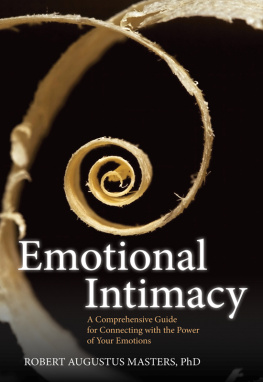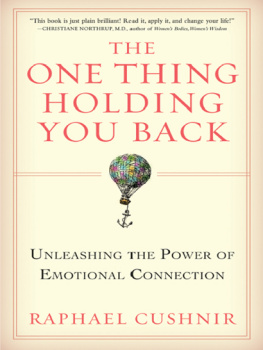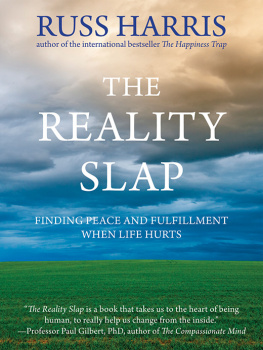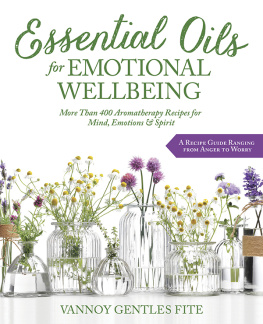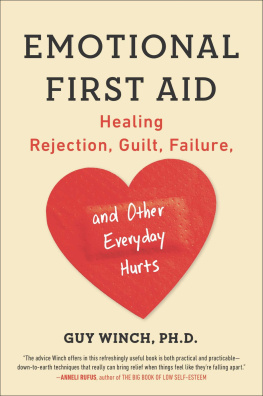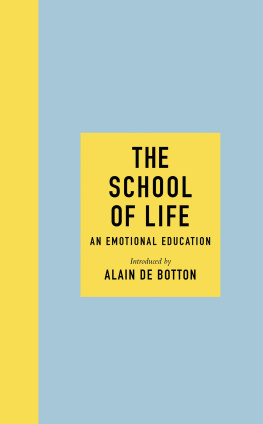This edition published 2013
Exisle Publishing Pty Ltd
Moonrising, Narone Creek Road, Wollombi, NSW 2325, Australia
P.O. Box 60490, Titirangi, Auckland 0642, New Zealand
www.exislepublishing.com
First published by Hudson Street Press in 2013
Copyright 2013 Guy Winch, PhD
All rights reserved. Except for short extracts for the purpose of review, no part of this book may be reproduced, stored in a retrieval system or transmitted in any form or by any means, whether electronic, mechanical, photocopying, recording or otherwise, without prior written permission from the publisher.
A CiP catalogue record for this book is available from the National Library of Australia
ISBN 978-1-921966-35-4
Cover design by Nick Turzynski, redinc. Book Design, Auckland
Cover image by Conrad Turzynski
Printed in Shenzhen, China, by Ink Asia
This book uses paper sourced under ISO 14001 guidelines from well-managed forests and other controlled sources.
10 9 8 7 6 5 4 3 2 1
PUBLISHERS NOTE
While the author has made every effort to provide accurate telephone numbers and Internet addresses at the time of publication, neither the publisher nor the author assumes any responsibility for errors, or for changes that occur after publication. Further, the publisher does not have any control over and does not assume any responsibility for author or third-party Web sites or their content.
Introduction
Ask a ten-year-old what you should do if you catch a cold and the child would immediately recommend getting into bed and drinking chicken soup. Ask what you should do if you get a cut on your knee and the child would advocate cleaning it (or using antibacterial ointment) and bandaging it. Children also know that if you break a bone in your leg you need to get a cast on it so it mends correctly. If you then asked why these steps were necessary they would tell you that treating such injuries helps them heal and prevents them from getting worse, that colds can turn into pneumonia, that cuts can become infected, and that if broken bones heal incorrectly youll have trouble walking once the cast comes off. We teach our children how to take care of their bodies from a very young age and they usually learn such lessons well.
But ask an adult what you should do to ease the sharp pain of rejection, the devastating ache of loneliness, or the bitter disappointment of failure and the person would know little about how to treat these common psychological injuries. Ask what you should do to recover from low self-esteem or loss and trauma and adults would be equally challenged. Ask how you might deal with intrusive ruminations or nagging guilt and you are likely to be met with sheepish looks, feet shuffling, and a pointed effort to change the subject.
Some might confidently suggest the best remedy is to talk about our feelings with friends or family members, certain that no mental health professional in his or her right mind would object to talking about feelings. But while discussing our feelings might offer relief in some situations, it can actually be damaging in others. Pointing out these dangers usually causes another round of sheepish looks, feet shuffling, and a pointed effort to change the subject.
The reason we take little to no purposeful action to treat the psychological wounds we sustain in daily life is because we lack the tools with which to manage such experiences. True, we could seek the counsel of a mental health professional in such situations, but doing so is often impractical, as most of the psychological wounds we sustain in life are not serious enough to warrant professional intervention. Just as we wouldnt pitch a tent outside our family doctors waiting room at the first sign of a cough or sniffle, we cant run to a therapist every time we get rejected by a romantic prospect or whenever our boss yells at us.
But while every household has a medicine cabinet full of bandages, ointments, and pain relievers for treating basic physical maladies, we have no such medicine cabinet for the minor psychological injuries we sustain in daily life. And sustain them we do, just as frequently as we do physical ones. Each of the psychological wounds covered in this book is extremely common and each of them is emotionally painful and potentially psychologically damaging. Yet, until now, weve had no conventional means to ease the pains, soothe the aches, and relieve the distresses of these events despite the regularity with which they occur in our lives.
Applying emotional first aid to such injuries can prevent many of them from affecting our mental health and emotional well-being going forward. Indeed, many of the diagnosable psychological conditions for which we seek professional treatment could be prevented if we applied emotional first aid to our wounds when we first sustained them. For example, a ruminative tendency can quickly grow into anxiety and depression, and experiences of failure and rejection can easily lead to erosions in our self-esteem. Treating such injuries not only accelerates their healing but also helps prevent complications from developing and mitigates the severity of any that do arise.
Of course, when the psychological injury is serious, emotional first aid treatments should not replace seeing a mental health professional any more than having a well-stocked medicine cabinet abolishes the need for physicians and hospitals. But while we know our limitations when it comes to our physical health, the same is not true of our mental health. Most of us can recognize when a cut is deep enough to require stitches, we can usually tell the difference between a swollen bruise and a broken bone, and we tend to know when were dehydrated to the point of needing an infusion of plasma. But when it comes to our psychological wounds, we lack not only the wherewithal to do anything about them but also the ability to identify when they require professional intervention. As a result, we often neglect our psychological wounds until they become severe enough to impair our functioning. We would never leave a cut on our knee unattended until it compromised our ability to walk, but we leave psychological wounds unattended all the time, often until they literally prevent us from moving forward in life.
This discrepancy between our general competence in treating assaults to our physical health and our complete incompetence where our mental health is concerned is extremely unfortunate. If no such emotional first aid techniques existed, if it were impossible to treat these psychological wounds, this state of affairs might be tolerable. But such is not the case. Recent progress in numerous areas of psychological research has unveiled many treatment options for exactly the kinds of psychological injuries we sustain most often.
Each chapter in this book describes a common and everyday psychological injury and the various emotional first aid techniques we can apply to ease our emotional pain and prevent the problem from becoming worse. These science-based techniques can all be self-administered, much as we self-administer first aid for our physical ailments, and they can also be introduced to our children. The techniques in this book represent the future staples of our psychological medicine cabinets, the mental health medical kits we can carry with us as we go through life.
During my years studying clinical psychology in graduate school I was frequently criticized for giving my patients specific and concrete suggestions for how they might alleviate their emotional pains. Were here to do deep psychological work, one supervisor used to admonish me, not to dispense psychological aspirinit doesnt exist!
But offering immediate relief and doing deep psychological work are not mutually exclusive. I believe everyone should have access to emotional first aid treatments, just as they should any other treatments for dressing emotional wounds. Over the years, Ive made it a practice to distill innovative research findings into practical suggestions, treatments my patients can apply to the emotional hurts of daily living. Ive done so for one main reasonthey work. For some years now, my patients, friends, and family members have been urging me to collect these emotional first aid treatments into a book. I decided to do so because its time we took our mental health more seriously. Its time we practiced mental health hygiene just as we do dental and physical hygiene. Its time we all owned a psychological medicine cabinet with the emotional equivalents of bandages, antibacterial ointments, ice packs, and fever suppressants.



